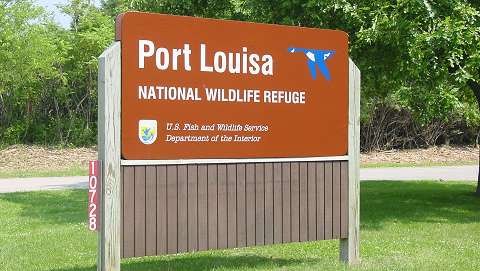
Iím one of the lucky people who get paid to do a job I really love. I spend 70 percent of my time working outdoors on the Refuge. Every day, I have firsthand encounters with some sort of wildlife ó young eagles perched to fledge, snapping turtles seeking nests, ducklings scooting across backwater sloughs, wetlands loaded with frogs, snakes basking in the sun, opossums waddling along the woods, etc. I get to experience the glories of nature as I work, such as the rich colors of Mississippi Valley sunrises, the wonderful dawn chorus of songbirds in spring, and the flight of thousands of ducks and geese into the Refuge in the fall.
Jamaica RPCV Karen Harvey counts herself among the lucky ones who get paid for a job they love
Helping put the Ďgreatí in the great outdoors: Louisa biologist counts herself among the lucky ones who get paid for a job they love
By Connie Street of the Muscatine Journal
Editorís note: Every Monday, the Muscatine Journal profiles a local figure who responds to questions provided by one of our reporters.
Karen Harvey has been working at the Port Louisa National Wildlife Refuge for two-and-one-half years. She came to Iowa after working at three wildlife refuges in California. After graduating from high school in Quincy, Ill., she earned her bachelorís degree at Oregon State University, then spent 21 years working for the U.S. Forest Service before joining the U.S. Fish and Wildlife Service.
Personal background
Name: Karen Harvey
Age: 52
Mailing Address: P.O. Box 16, Wapello, IA 52653 (I work in Wapello but live in a farmhouse north of West Burlington.)
Occupation: Wildlife biologist at the Port Louisa National Wildlife Refuge
Immediate family members: None; I am single.
Q&A
1) What do you like best about your job?
Iím one of the lucky people who get paid to do a job I really love. I spend 70 percent of my time working outdoors on the Refuge. Every day, I have firsthand encounters with some sort of wildlife ó young eagles perched to fledge, snapping turtles seeking nests, ducklings scooting across backwater sloughs, wetlands loaded with frogs, snakes basking in the sun, opossums waddling along the woods, etc. I get to experience the glories of nature as I work, such as the rich colors of Mississippi Valley sunrises, the wonderful dawn chorus of songbirds in spring, and the flight of thousands of ducks and geese into the Refuge in the fall.
The projects we do to restore prairies, wet meadows and oak savannas are some of the most challenging and exciting work Iíve had in my career.
2) What kinds of birds use the Refuge?
The Refuge supports 294 species of birds, including 33 species of ducks and geese, 40 species of waterbirds (herons, egrets, rails, etc.), 32 species of shorebirds, 26 species of hawks and owls, seven species of woodpeckers and 142 species of songbirds. My personal favorites are the northern pintails, the American bitterns, the lesser yellowlegs, the short-eared owls, the pileated woodpeckers, the black-billed cuckoos, the ovenbirds, and the bobolinks.
3) How important is the habitat on the Refuge for birds?
The Refuge represents some of the last remaining, large tracts of seasonal wetland, prairie grassland, wet sedge meadow and floodplain forest found in eastern Iowa. It provides extremely important habitat for bird species that are in a rapid decline regionally and nationally.
Cerulean warblers have declined an average of 4.2 percent per year, an alarming 75 percent since 1966. The olive-sided flycatcher, king rail, loggerhead shrike and black tern have undergone similar declines of 60-70 percent.
The eastern meadowlark, northern bobwhite and American bittern have experienced 50-58 percent declines. Even such common birds as the American goldfinch and whip-poor-will have declined approximately 20 percent since 1966.
North American Breeding Bird Survey results indicate that grassland bird species have shown greater and more consistent declines than any other group of birds (23 species in decline). Of the 417 bird species that breed in North America but migrate to the Neotropics for the winter, approximately 50 percent of them exhibit long-term declining trends.
The loss of habitat is the primary cause of these declines. Places like the Port Louisa National Wildlife Refuge act as strongholds of habitat for these declining species.
4) Who has made the biggest impact on your life? How?
My mother. She grew up during the Great Depression and has always had a special place in her heart for those less fortunate, especially disadvantaged children. She taught me kindness, compassion, the importance of human dignity, and how to be true to your convictions. Her love of family and friends is boundless.
But, more importantly, she instilled in me a love for the natural world and encouraged the spirit of adventure and curiosity that comes with a childhood linked with nature. Thanks, Mom for:
n Cutting up your tablecloth to let me see what emerged from the cocoon of an escaped caterpillar;
n Tolerating the wild chase for frogs and mice loose in the house;
n Helping your children make terrariums and rock gardens;
n Putting up with my pet squirrel monkey who thought he ran the household;
n Spending countless hours wading creeks and rambling along beaches with your children;
n Using your vacation time and limited resources to show us the wonders of national parks, etc.
5) What is the most important thing other people should know about you?
Family comes first in my life ó one of the main reasons I came to Iowa to work was the opportunity to spend more time with my mother, brother and two small nieces.
Iím happiest when Iím out in wild places.
I believe that the measure of success for anyone in this world truly depends on the depth of oneís desire and how hard you are willing to work for it.
6) What do you enjoy doing most during your free time?
I love to travel and spend time hiking and backpacking in national parks and wilderness areas. Locally, I enjoy raising a garden and canning, going to concerts and plays, watching rodeos and baseball games, and fishing.
7) What do you like most about the community in which you reside?
The rural setting where I live. The way neighbors watch out for each other and help each other.
8) What should be changed to improve your community and how should that be done?
All over this country, as well as in Iowa, there is a critical need to reacquaint children to nature. To quote Richard Louv (author of ďLast Child in th WoodsĒ): ďNever before in history have children been so plugged in ó and so out of touch with the natural world. Computers, TV, video games, and ever-increasing homework loads compete for their time. There are human costs to alienation from nature. Our relationship to nature as children shapes our lives as adults. Given a chance, a child will bring the confusion of the world to the woods, wash it in the creek, turn it over to see what lives on the unseen side of that confusion. In nature, a child finds freedom, fantasy, and privacy: a place distant from the adult world, a separate peace.Ē
The adults in their lives need to commit to introducing children to the joys and wonder of nature available to them right down the road in their own back yard at state parks, county parks, refuges and wildlife management areas. Itís up to us to show them the way and set the example.
9) What public service or other volunteer work have you done?
My most rewarding volunteer experience was the 2½ years I spent in the Peace Corps helping to establish national parks and wildlife protected areas in Jamaica.
Other satisfying volunteer work Iíve done in the past includes serving as a board member for a Native Grassland Association, working with a Friends of the Library group to improve resources and upgrade the library collection, playing with a community band, and being an assistant coach for two little league baseball teams.
10) What is your most important personal goal for the next five years? Why?
To finish the construction work on the retirement house Iíve been building out in Montana. Iíve been doing the interior construction work myself over the last eight years and probably have three more years of vacation work until itís done. I want it to finally be a place where family members are comfortable to spend a holiday.























